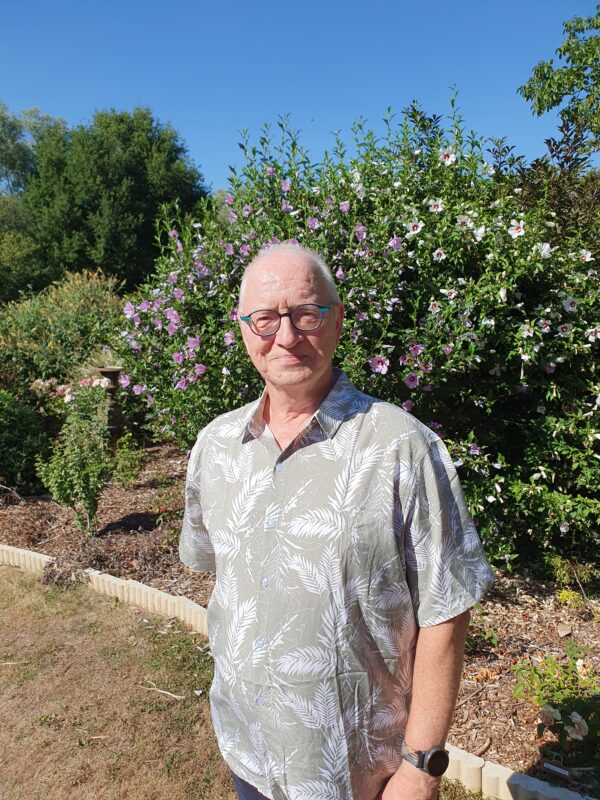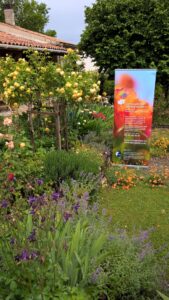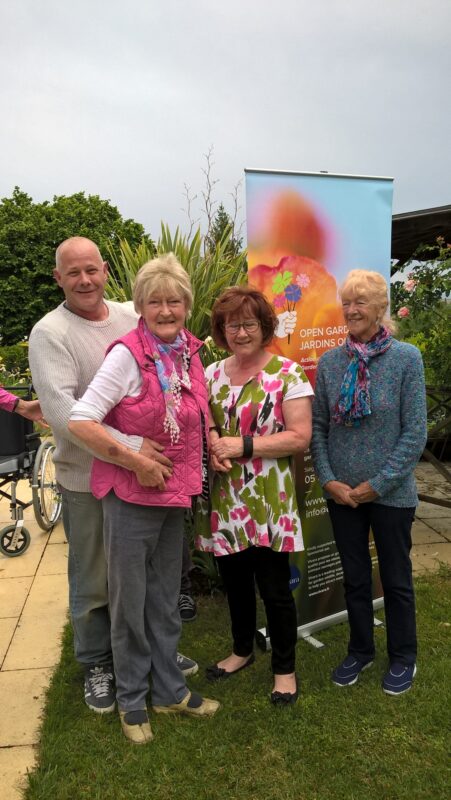A Day in the Life of a Garden Coordinator…
Ever wondered what it’s like to help bring beautiful gardens to life — not just for your own pleasure, but for the enjoyment of others and to raise money for vital causes? Meet Ian Warden, one of the many dedicated volunteers behind the Association ‘Open Gardens/Jardins Ouverts’. As a Garden Coordinator, Ian plays a key role in connecting gardeners, organising events, and building a sense of community — all while indulging his lifelong passion for plants (and a little bit of cake too….).

-------
Can you tell us a little bit about your background? What you used to do and how you ended up in France?
For most of my working life, I was a teacher in the Arts sector. However, I have been interested in plants since I was a young adult with my first garden, and I realised a bit of a dream when I opened a plant nursery after taking early retirement in 2002. With my partner, I ran this nursery as part of a complex which offered a display garden, nursery, tearoom and antiques shop for many years.
Moving to France had also been a bit of a dream, which began in 2008 when we bought a holiday home in the Dordogne. Over the ensuing years, I visited regularly, becoming involved in Open Gardens/Jardins Ouverts as a coordinator in 2015. When we moved here permanently in 2020 and bought a new property, I was also able to begin creating a garden which we opened for the first time in 2025.
What inspired you to become a garden coordinator for Open Gardens/Jardins Ouverts?
In the UK, we had opened our garden for the National Gardens Scheme (the famous ‘Yellow Book’) for about 12 years and I had often regretted the fact that France had no equivalent organisation, since I believed wholeheartedly in the principle of opening gardens for charitable purposes. I was, therefore, delighted when I read an advert by Mick Moat (the charity’s founder) asking for volunteers to take on the role of coordinator in my region.
How did you first get involved with the charity?
Mick, who was always unstinting in his willingness to travel in order to further the aims of the Association, came to the Charente to meet up with two ladies and myself who had all been keen to find out more. Over tea and cake, we listened to his plans for the development of Open Gardens/Jardins Ouverts and were won over by his enthusiasm.
Did you have any hesitations before signing up—and what made you go for it?
My only hesitation was that, at that point, I wasn’t living full-time in France, but I was reassured that I could still play a full part in the role. There were three of us originally, covering the south Charente and the north west Dordogne, the other two coordinators being French residents, so that made the situation easier.
THE ROLE ITSELF
What does a typical year look like for a garden coordinator?
I usually start to think about beginning the year’s activities in January when I send a letter out to all our current garden owners, thanking them for opening the previous year, reminding them of how much was raised the previous year and suggesting that they might like to be thinking about whether or not they will open for us that year and how else they might contribute if opening is not on the cards. I also point out that I will be in touch in April to invite them to our annual pre-season get together.
Prior to this invitation, I usually place an advert on the DVN (our local, indispensable news network) inviting anyone interested in opening to get in contact. This means that interested parties can join us at our meeting. This, of course, is followed in April by an invitation to this get-together, held at the home of one of our garden owners. The meeting, at which copious amount of tea and cake are consumed, is held in early May and is principally an opportunity for our garden owners, and volunteer helpers, to meet, talk about the previous year’s openings, share ideas and views and answer any questions which new garden openers might have. I think that this helps us to feel that we are part of a united effort. New garden openers often need help with setting up their webpages, deciding on dates and times, organising parking, finding helpers etc.
During the rest of the season, my time is taken up with visiting potential new gardens and supporting current garden owners (as outlined below). I also attend every garden opening.
What kinds of tasks are you responsible for before, during, and after an open garden event?
This can vary enormously. Our experienced garden owners often need little assistance, but some need quite a lot of handholding. As mentioned above, prior to opening, advice might be needed on a whole variety of things such as setting up a webpage, deciding on dates and times, organising parking, finding helpers, suggesting ways of advertising and so on. I try to encourage garden owners to be as independent as possible, but I usually place adverts on the DVN and in the French events magazine ‘Totem’, as well as circulating open garden dates to my garden group contacts.
How much time does the role usually take, and how flexible is it?
How long is the proverbial piece of string? I suppose that it depends on how much time you’re prepared to give to the role. I enjoy it, especially the garden visiting, so it’s a pleasure and doesn’t feel like it’s taking up my time. From April until about the end of July, there is quite a lot to organise, but a great deal of it is done at the computer or on the phone, so can be done without too much impact on one’s own gardening commitments!
What kind of support or resources do you receive from the Association?
For me, one of the greatest necessities is to have good communication and the Association Officers are excellent at this. Queries are answered promptly and help always given if required. Garden owners receive all necessary resources to support their garden openings and coordinators are always kept fully informed about developments, changes and so on.
HIGHLIGHTS & IMPACT
Can you describe one of your most memorable open garden days?
Probably my most memorable garden open day has been my own garden opening this year – a hugely enjoyable and rewarding event. Apart from that, I do remember as we were all coming out of the covid period and restrictions were being slowly lifted, one garden opening which took place in the evening rather than the planned daytime opening and it was really lovely. Early evening can be a splendid time to walk round a garden and enjoy the company of friends with a cup of tea and cake and that evening was one such.
How do you think the events benefit the local community or the gardeners themselves?
I think that most garden owners enjoy the experience of sharing the results of their hard work with others. In general, garden visitors are a great bunch of people, and they appreciate the efforts of others. An open garden can provide a lovely opportunity for residents of a community to come together and share an enjoyable experience.
What’s your favourite part of being a coordinator?
As a passionate gardener and plantsman, I have to say that it’s visiting other gardens which gives me the greatest pleasure, but there are many rewarding parts of the role, not the least of which is meeting new people and contributing to the exceedingly worthwhile work of our organisation.
Have you built lasting friendships or networks through your role?
I have met many new people as a result of the role and also travelled to parts of the region which have been new to me. I think of our network of garden owners as being its own, small community and I like to think that we have often brought people together who share a common interest.
CHALLENGES & ADVICE
What’s the most challenging aspect of coordinating a garden or multiple gardens?
Being able to be diplomatic is useful – not all gardens are suitable for opening to the public, at least not without some alterations or development, but the fact that someone is willing to do so has to be respected. Sometimes an apparently unsuitable garden can be twinned with another garden nearby, or the owner might be persuaded to hold an event in the garden so that the focus becomes the event rather than the garden.
Practical things, such as finding enough helpers or sorting out issues of parking can be tricky, but the most challenging aspect of the role is finding new gardens. Not everyone wants to open every year and some only want to open once, so finding new gardens becomes very important. Selling annual membership only works if people feel that there will be enough gardens in their area to visit to make it worthwhile.

What tips would you give to someone thinking about becoming a coordinator for the first time?
Talk to other coordinators to find out more about the role. Visit gardens already open with the scheme in order to familiarise yourself with how they do things. Be sensitive to your garden owners’ needs – respond to them rather than impose too much upon them. Keep an eye and ear open for potential gardens – most of my new gardens still come via word of mouth.
Is there anything you wish you’d known when you first started?
When I first started, the role of coordinator was in its infancy, and it has developed a great deal since then. There is a lot of support available and new coordinators should feel confident about using that support.
ENCOURAGEMENT FOR OTHERS
What would you say to someone who loves gardens but isn’t sure they’re “qualified” to be a coordinator?
There is no real qualification as such, but if there were, a love of gardens would probably be the main one. As in life, you won’t know if you don’t give it a go. It’s such a worthwhile role to play and very fulfilling. There is a lot of support available and other coordinators will always be happy to share tips and wrinkles with you.
In what ways do you feel you’re making a difference through this role?
Over 11 years, the organisation has donated over 176,000 € to a diverse range of children’s charities in France and I like to think that in playing my role, I have helped to achieve that. The coordinator is often the physical link between the garden owner and the Association; people want to help to fund raise for such worthwhile causes, but they need help to be able to do so. This is where the coordinator comes in.
Why do you think Open Gardens/Jardins Ouverts is a cause worth supporting?
The results speak for themselves. Such a lot of money raised in support of disabled and seriously ill children is an end in itself. To be able to do this whilst giving pleasure to thousands of people is a win – win.
Could you share a photo from one of your events and tell us the story behind it?
Several years ago, we had a lovely lady called Jenny Swan who used to open for us. Very sadly, Jenny is no longer with us, but memories of her and her garden live on. Jenny was principally wheelchair bound, but always had a smile, and was modest about her achievements in her beautiful garden. We took some photos of her and of her garden to use in Open Gardens/Jardins Ouverts publicity and it’s lovely to see them and be reminded of a special person.

Do you have a favourite garden moment that sums up why you love being a coordinator?
I love to see garden visitors turning up, even in the rain, to support our scheme, because for me this encapsulates the true spirit of giving. Every successful garden opening is a joy to celebrate. We can be proud of the donations we have raised in our region, and I hope that we can continue to be able to offer support to worthy causes in this way.
--------
We hope Ian’s story has inspired you. If you would like to find out more about how to become a Garden Coordinator or would like to open your own garden, please contact Susan Lambert at president@opengardens.eu or via their website https://www.opengardens.eu/
